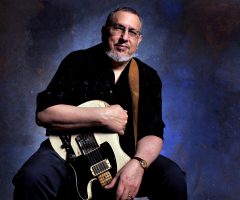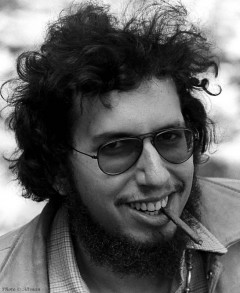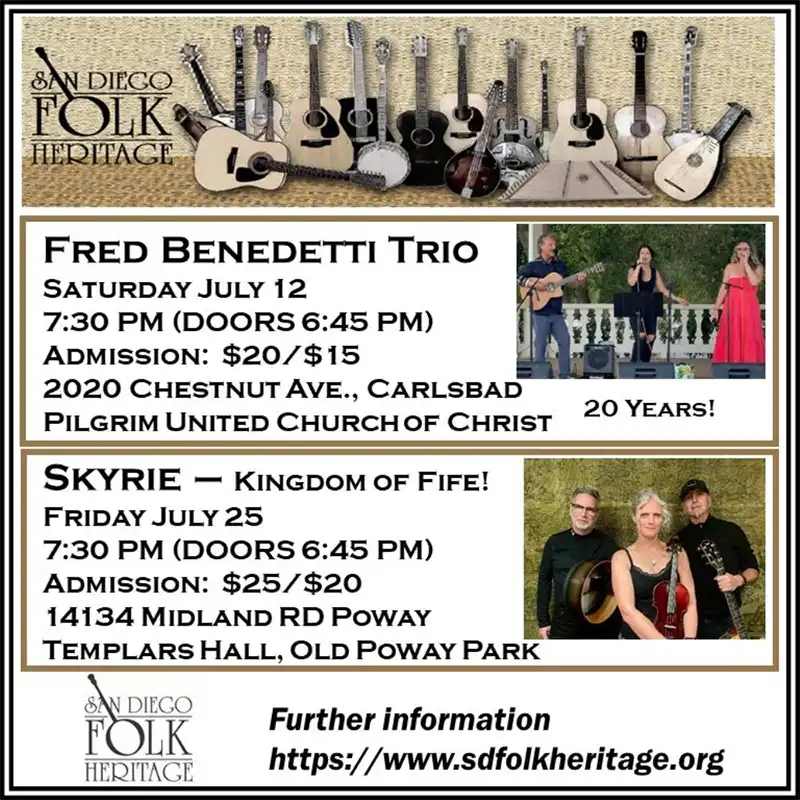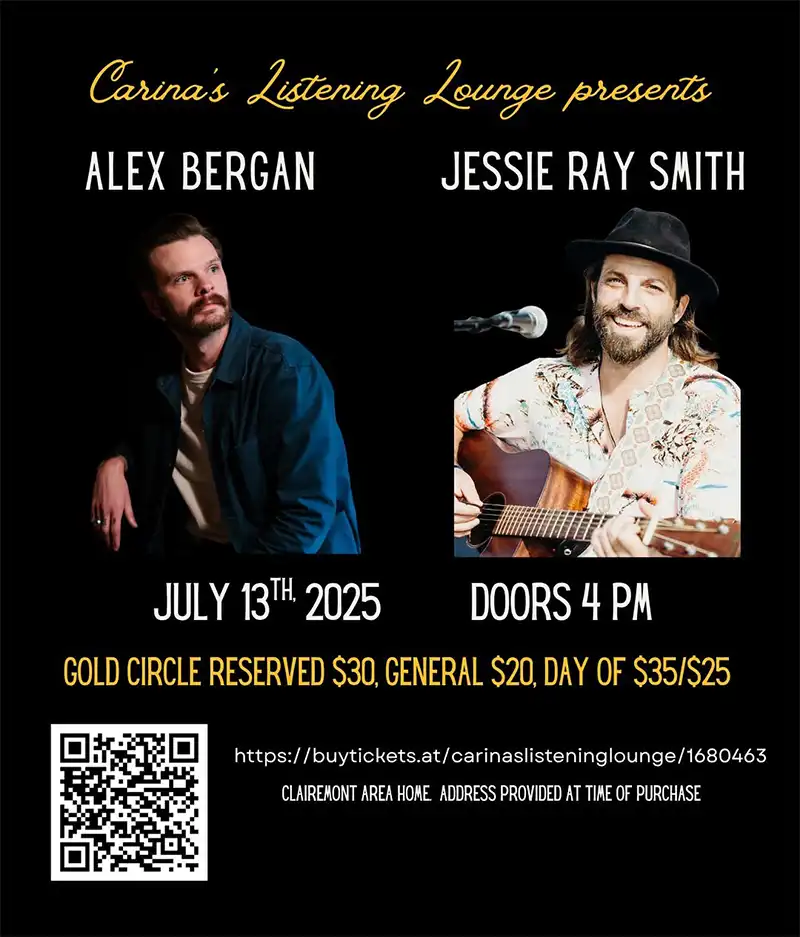Tales From The Road
David Bromberg: His Unsung Treasure of Hope and Faith

David Bromberg

Bromberg in 1974. Photo by Robert Altman.
“The reason man created stringed instruments: David touched them with a lover’s fingers and they moaned that true love right back at him. Wood and wire and flesh spoke.”
–Jerry Jeff Walker
Every American artist worth their salt has a story to tell. Many from our musical heritage have left us in flames of self-destruction. Others have lived long, had their downturns, returned restored, and have given back the hope they found in the depth of their spirits through the music they created.
On veteran multi-instrumentalist, David Bromberg’s 2013 album, Only Slightly Mad, the artist takes us on an American musical journey through a diversity of styles, influences, and original strains of blues-soaked celebrations that is as infectious as it is iconic. The album begins with the solid take on Blind Willie Johnson, then moves through Big Bill Broonzy, and eventually takes a Celtic instrumental turn before it turns a corner to the traditional country of Conway Twitty. What’s most striking about an artist most known for his instrumental artistry is his full-bodied way of taking ownership of each style with complete assurance and authority. It is a broad and beautiful take on the American landscape where Bromberg has walked over the last 50 years. And this is from an album that Bromberg intended to be a Chicago blues foray. For an idea of how long he’s been championing this kind of diversity, he called Only Slightly Mad an “old fashioned Bromberg album.”
The list of artists he has collaborated with and supported in the studio and concert stage reads like a Who’s Who of a half century of popular music. They include Bob Dylan, Jerry Jeff Walker, George Harrison, Gordon Lightfoot, Link Wray, Rick Derringer, Carly Simon, Sha Na Na, Edie Brickell, Eric Andersen, John Prine, Johnny Shines, Willie Nelson, the Eagles, Linda Rondstadt, Vince Gill, Los Lobos, and Levon Helm, to name only a few.
Known as a near musical chameleon for other artists, his solo work is certain and defined and as he rides between Piedmont acoustic and Chicago-Big City electric Muddy Waters-like blues, his distinction is a blues vocal with an attitude accompanied by a guitar that has so much a life of its own, it can talk. Anyone who has seen Bromberg live can testify to the truth of his conversations with his guitar.
After growing up 40 miles north of New York City in Tarrytown in a small Jewish community, he first plugged into music when he was 13 years old, discovering rock and roll in the ’50s followed by a saturation in Pete Seeger and Woody Guthrie, which led him to the Rev. Gary Davis. By the time he enrolled in musicology at NYU, he was studying blues guitar with Davis. It was from the folk music movement of the late ’50s that he would also discover Flatt & Scruggs, Bill Monroe, and Doc Watson.
He came from an enviable generation of young musicians who stood midstream between the great blues, folk, and country legends who were being discovered and featured in the Greenwich Village of the early to mid-’50s and the rising of future icons like Bob Dylan. This became his musical foundation. However, he it took equal measures of Chicago blues, Nashville country, and traditional folk and bluegrass music to feed his interest and grow his talent.
He eventually became known as the finest guitar slinger in the village, earning nods from the likes of Jerry Jeff Walker, the Mr. Bojangles-singing New York City native and Texas transplant. After studio and live gigs with Tom Paxton, Tom Rush, and Richie Havens, Bromberg was invited to accompany Rosalie Sorrels to the now legendary 1970 Isle of Wight Festival, which boasted Jimi Hendrix and Bob Dylan and the Band on the bill. When the opportunity arose to play a spontaneous set following Sorrels, the reception was so good, he was signed to Columbia records. His first solo album is now a classic of Americana form, including all of the diversity of style with his own signature brand on both song and instrumental solos on acoustic and lead guitar, mandolin, dobro, and slide guitar.
In 1972, as a debut artist on a major record label, he scored a coup by collaborating with Beatle, George Harrison fresh into his solo career. It may have been both Bromberg’s offbeat sense of humor and his talent on the slide guitar that drew the quiet Beatle to him. The two artists wrote the “The Robber” for Bromberg’s first self-titled solo album, which is a comical love song from the robber to his wealthy victim and includes the line “wealth is the disease and I am the cure.” It was most likely no coincidence that this was the same year Bromberg appeared on Bob Dylan’s New Morning, which also includes the Harrison collaboration “If Not for You.”
Although, being a solo artist was never Bromberg’s intention, his albums during the ’70s helped to define the Americana music of today with the diversity and fearless stance in the fundamentals of what is best in the music of the past. He is one of the handful of American artists who defined the term, “genre bending.”
One of the highlights of his live performances is his blues rant. To call it a rant is probably an understatement. On the electric blues song “I Ain’t Never Gonna Be Your Fool,” it begins like a wee-hours Chicago blues song then decomposes into a crazed deep-South, Pentecostal-fevered blues sermon that has changed with the times over the years. He has perfected it into his own standard, expected at every show. In some shows the rant break turns into lessons on science, psychology, religion, anthropology, history, all-in-one insane three-minute rant. It is never quite the same and has to be heard to be believed. This is the kind of blend of great music with humor, soul, and passion that has made Bromberg an American musical institution to be reckoned with.
But, like all good stories and in the unpredictability of American lives, Bromberg’s story takes a few unexpected turns. His artistic and live groundwork was laid down in the ’60s and ’70s. The story is told in full in the 2012, critically praised film David Bromberg: Unsung Treasure, directed by Beth Toni Kruvant. The film chronicles his musical career from the mid-’60s with unseen footage of performances and interviews, then tells how fatigue caused him to drop out from the recording and concert scene. He has continued his passion for music by opening a violin shop with his wife in Wilmington, Delaware. He began the business of making and restoring violins and in a parallel story that taps into the spirit behind the music, he was led to bring music to the run-down, impoverished community in historic Wilmington. That resulted in a revitalized community, energized and inspired by music and a renewed desire to create his own music.
In 2007 Try Me One More Time, an excellent, simple album of traditional folk and blues song that is nominated for a Grammy. As the healing and re-birth continues, Bromberg contacted old friends like Dr. John, Levon Helm, John Hiatt among others, went to Nashville to “mess around,” and recorded what became 2011’s Use Me, which also includes Linda Rondstadt, Keb’ Mo’, Tim O’Brien, and Vince Gill. Use Me became part of the film of Unsung Treasure; Bromberg asked each artist to either write a song or interpret a selected tune, thus giving the album its name. The result is stunning. A rare kind of collaborative album that works so well at every turn, it hurts to hear the last track.
This year, as Bromberg begins a lengthy tour, he continues to run his violin shop. In 2013, the release of Only Slightly Mad adds another chapter to his legacy. It is produced by Levon Helm’s three-time Grammy winning producer, Larry Campbell, and recorded at Helm’s studio in Woodstock, New York.
In addition to his own band, Bromberg enlists the help of Levon Helm’s touring band as well on the record. Indeed, the album, more than any of his others, carries something of the earthy spirit of Levon Helm. Most telling and inspiring is his original, gospel-focused “I’ll Rise Again.” The song is a testament to Bromberg’s life and career and also to the hope that music provides for us all. Bromberg’s story is the same, a source of hope and inspiration that reflects how music touches and heals the deepest parts of our spirits and can reach out from singular life to a wounded world around us and provide much needed energy and healing.
See David Bromberg live at AMSD Concerts, 1370 Euclid Ave., San Diego, 7:30pm. For further info: amsdconcerts.com






